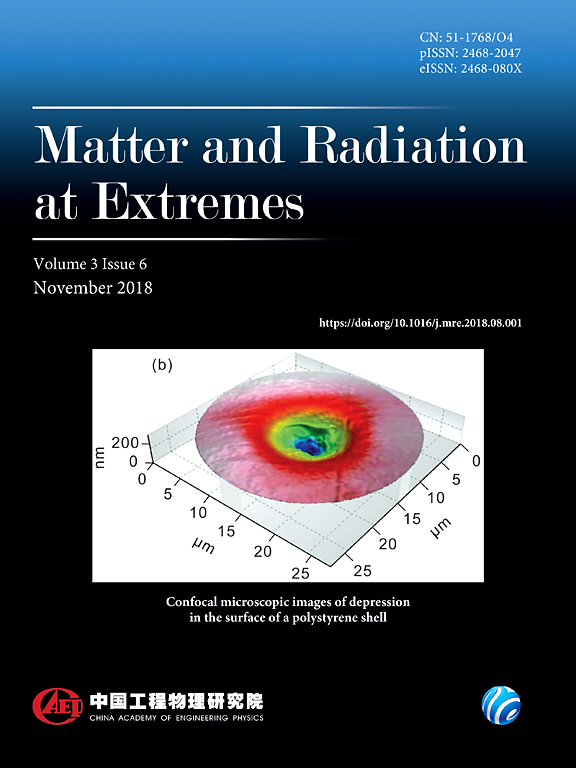Compact ultrafast neutron sources via bulk acceleration of deuteron ions in an optical trap
IF 4.7
1区 物理与天体物理
Q1 PHYSICS, MULTIDISCIPLINARY
引用次数: 0
Abstract
A scheme for a quasi-monoenergetic high-flux neutron source with femtosecond duration and highly anisotropic angular distribution is proposed. This scheme is based on bulk acceleration of deuteron ions in an optical trap or density grating formed by two counter-propagating laser pulses at an intensity of ∼1016W/cm2 in a near-critical-density plasma. The deuterons are first pre-accelerated to an energy of tens of keV in the ambipolar fields formed in the optical trap. Their energy is boosted to the MeV level by another one or two laser pulses at an intensity of ∼1020W/cm2, enabling fusion reactions to be triggered with high efficiency. In contrast to previously proposed pitcher–catcher configurations, our scheme can provide spatially periodic acceleration structures and effective collisions between deuterons inside the whole target volume. Subsequently, neutrons are generated directly inside the optical trap. Our simulations show that neutron pulses with energy 2–8 MeV, yield 1018–1019n/s, and total number 106–107 in a duration ∼400 fs can be obtained with a 25 μm target. Moreover, the neutron pulses exhibit unique angularly dependent energy spectra and flux distributions, predominantly along the axis of the energy-boosting lasers. Such microsize femtosecond neutron pulses may find many applications, such as high-resolution fast neutron imaging and nuclear physics research.通过在光学陷阱中对氘核离子进行体加速实现紧凑型超快中子源
我们提出了一种具有飞秒持续时间和高度各向异性角分布的准单能高通量中子源方案。该方案基于氘核离子在近临界密度等离子体中的光阱或密度光栅中的批量加速,光阱或密度光栅由两个反向传播的激光脉冲形成,激光脉冲强度为 ∼1016W/cm2 。氘核首先在光学阱形成的伏极场中被预加速到数十千伏安的能量。再通过一到两次强度为 ∼1020W/cm2 的激光脉冲将氘核能量提升到 MeV 水平,从而高效地引发聚变反应。与之前提出的投手式捕获器配置不同,我们的方案可以提供空间周期性加速结构,并在整个靶体积内实现氘核之间的有效碰撞。随后,中子直接在光学捕获器内产生。我们的模拟结果表明,使用 25 μm 靶件可以获得能量为 2-8 MeV、产率为 1018-1019n/s 和总数量为 106-107 的中子脉冲,持续时间为 400 fs。此外,中子脉冲表现出独特的角相关能谱和通量分布,主要沿能量增强激光器的轴线分布。这种微小尺寸的飞秒中子脉冲可能会有很多应用,如高分辨率快中子成像和核物理研究。
本文章由计算机程序翻译,如有差异,请以英文原文为准。
求助全文
约1分钟内获得全文
求助全文
来源期刊

Matter and Radiation at Extremes
Physics and Astronomy-Atomic and Molecular Physics, and Optics
CiteScore
8.60
自引率
9.80%
发文量
160
审稿时长
15 weeks
期刊介绍:
Matter and Radiation at Extremes (MRE), is committed to the publication of original and impactful research and review papers that address extreme states of matter and radiation, and the associated science and technology that are employed to produce and diagnose these conditions in the laboratory. Drivers, targets and diagnostics are included along with related numerical simulation and computational methods. It aims to provide a peer-reviewed platform for the international physics community and promote worldwide dissemination of the latest and impactful research in related fields.
 求助内容:
求助内容: 应助结果提醒方式:
应助结果提醒方式:


